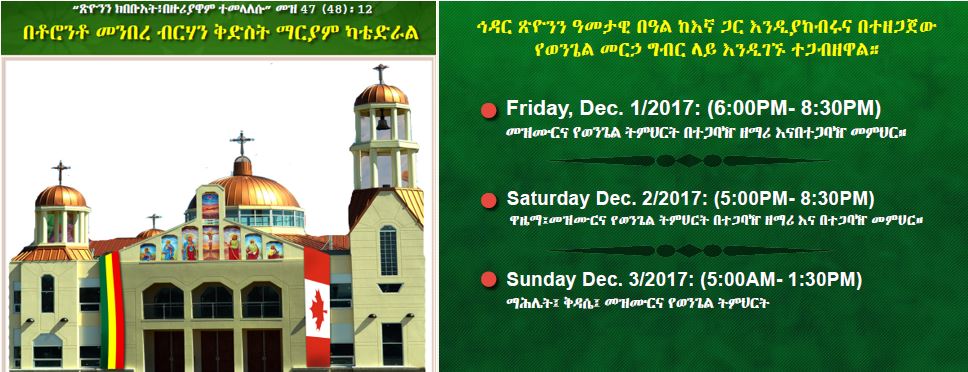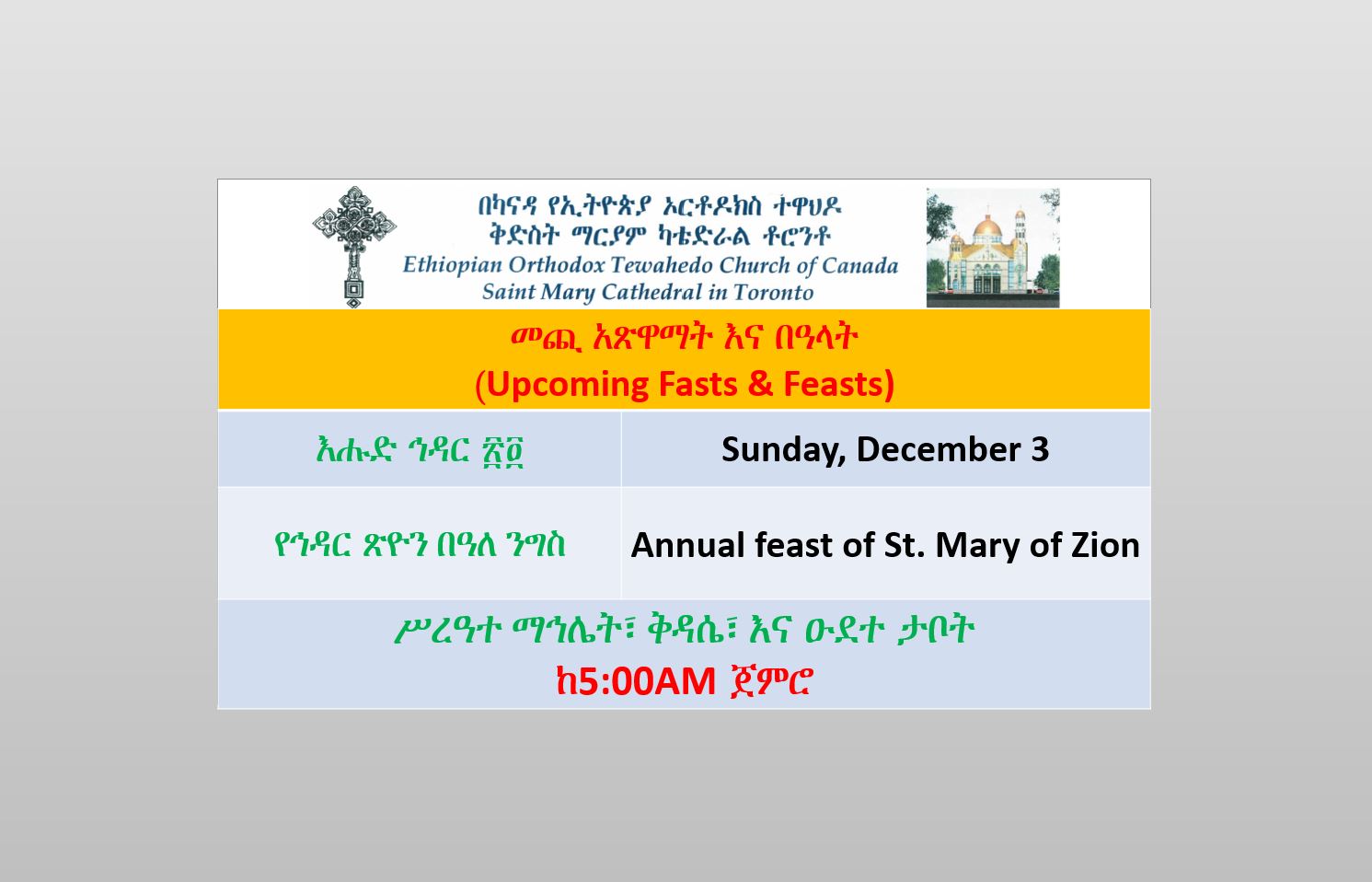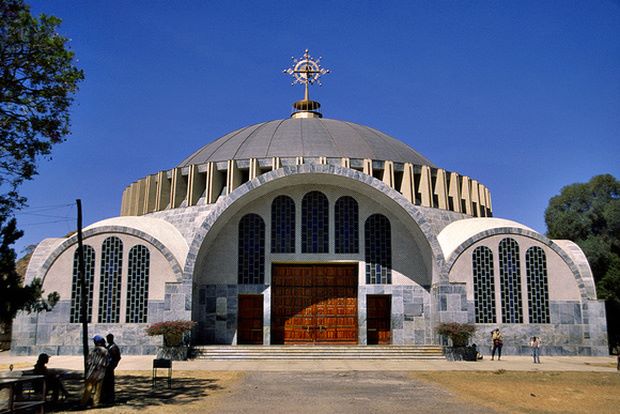



Annual Feast of St. Mary of Zion
This is a feast colorfully celebrated every year on Hidar 21 (November 30) at every church dedicated to St. Mary. The day is observed with special fervor particularly in Axum Tsion where the ArK of the Covenant is housed safely. The occasion is attended by massive Christian pilgrimages from all over Ethiopia and also foreign visitors making it one of the most joyous annual pilgrimages in Axum, the sacred city of Ethiopians.
The Church of Our Lady Mary of Zion claims to contain the original Ark of the Covenant.The Feast of the Ark of the Covenant (locally known as Tabote Tsion) is held in commemoration of different historical events including the coming of the Ark of the Covenant to Ethiopia and the construction of the first church dedicated to St. Mary in Axum.
The day also marks the destruction of Dagon by the power of the ark of God, as recorded in the Bible, and the return of the ArK to Israel after seven months of exile at the Dagon’s house in Philistine. (1 Samuel 4; 6)
The Origin of the Ark of the Covenant
The Ark of the Covenant described as the original container for the Ten Commandments and the central symbol of God’s presence with the people of Israel. Its names convey the holy sense of God’s presence. The Hebrew word for ark means simply “box, chest, coffin,” as is indicated by its use for the coffin of Joseph (Genesis 50:26) and for the Temple collection box of King Joash (2 Kings 12:9-10).
The word “covenant” in the name defines the ark from its original purpose as a container for the stone tablets upon which the Ten Commandments (sometimes called the “testimony”) were inscribed. Sometimes it is identified with many names but most ornately known by “the Ark of the covenant of the Lord of hosts Who is enthroned on the cherubim” (1 Samuel 4:4).
The origin of the Ark goes back to Moses at Sinai. It was planned during Moses’ first sojourn on Sinai and built after all the tabernacle specifications had been communicated and completed. (Holman Bible Dictionary 1991),
After the exodus of the Israelites from Egypt, God gave them the tablet of the Ten Commandments (Tabote Tsion) through Mosses in the mount of Sanai so they use it as a sacred instrument to worship God. The Ark was carried by the Israelites during their 40 years of journey to the land of hope. Whenever they camped, the Ark was placed in a special and sacred tent called the Tabernacle.
The Captivity of the Ark of God and the Death of Eli
In the course of time, during the reign of Elli, unusual events took place among Palestinians and Israelites. The story recounted in the 1st Book of Samuel goes as follows. The old priest Eli had two children (Hophni and Phinehas) who were behaving wickedly, taking for themselves all the prime cuts of meat from sacrifices and committing adultery with women who served at the sanctuary`s entrance.
Eli was aware of their behavior but he rebuked them too lightly and was unable to make them give up their bad deeds. He used to tell them, “my children what I heard of you is wrong; if a man does wrong to a man to God is prayed for, but how could you do wrong to God?” but he refrained from punishing them because they were his sons.
Eli’s sons kept on doing sinful acts, and so, Samuel the Prophets was sent to Eli to tell him that he and his family will be punished for their wrongdoing: “God has sworn unto the house of Eli, that the iniquity of Eli’s house shall not be purged with sacrifice nor offering forever …In that day I will perform against Eli all things which I have spoken concerning his house. When I begin, I will also make an end. For I have told him that I will judge his house for ever for the iniquity which he knoweth; because his sons made themselves vile, and he restrained them not.” (1 Samuel 3:12-14)
As a result, the Philistines attacked Israel. “And the Philistines put themselves in array against Israelites; and when they joined battle, Israel was smitten before the Philistines, and they slew of the army in the field about four thousand men eventually capturing the Ark of the Covenant from the Israelites and killing Eli’s sons, who accompanied the Ark to the battle as priests. (1 Samuel 4:2)
Israelites were always victorious in their battles whenever they had Tabote Tsion amidst them. But because God’s wrath was on them due to the sins of Eli’s sons, they lost the battle and many thousands died in the war filled. Tabote Tsion was captured in the battle and both of Eli’s sons were killed.
Eli, who was nearly blind, was unaware of the event until he asked about all the commotion. Sitting in a chair, he was told what had happened by a soldier who had fled the battle. The soldier said to Eli "I am one who has barely escaped from the war to tell you that the ark has been captured by our enemies and both of your sons died on the war"
Upon hearing the shocking news, Eli fell backwards out of his chair and died from a broken neck. He was a Judge of Israel for a total of 40 years, and died at the age of 98. His daughter-in-law, the wife of Phinehas, was pregnant and near the time of delivery. When she heard the news that the Ark of God had been captured and that her father-in-law and husband were dead. She went into labor and gave birth, but was overcome by labor pains. As she was dying, the women attending to her said "Don’t despair; you have given birth to a son." But she did not respond or pay any attention. She named the boy Ichabod, to mean The Glory has departed from Israel – because of the capture of the Ark of God and the deaths of her father-in-law and her husband.
After their victory at Ebenezer, the Philistines took Tabote Tsion to their country but misfortune fell on them. When in Ashdom, it was placed in the temple of Dagon under the idol. The next morning Dagon was found prostrate, bowing down before Tabote Tsion. They again restored the idol to its original place but yet again on the following morning Dagon was found broken into pieces.
The Philistines were also plagued by diseases and an outbreak of mice. They then sent Tabote Tsion to the land of Ashdon. But the same tragedy occurred among the people of Gath and Ekron to whom Tabote Tsion was moved. After the Ark had been among them for seven months, the Philistines, on the advice of their diviners, returned it to the Israelites, accompanying its return with an offering consisting of golden images of the tumors and mice with which they had been afflicted. The Ark was then set in the field of Joshua (1 Sam. 6:1-15).
Based on these miraculous events, the Ethiopian Church celebrates the feast of the Ark of the Covenant locally known as Tabote Tsion.
May the intercession and blessings of Saint Mary be up on us all!
Source:
Holman Bible Dictionary, published by Broadman & Holman, 1991.
"Sacred Sites of Ethiopia and the Arc of the Covenant". Sacredsites.com. Retrieved 2016-11-27.